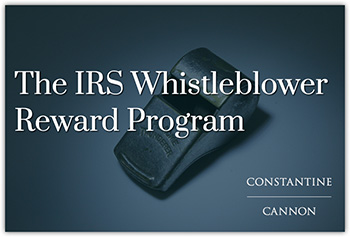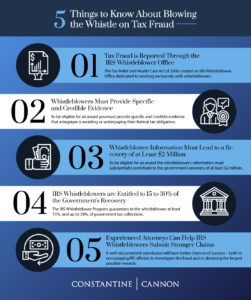
The Internal Revenue Service’s whistleblower office incentivizes people to report tax evasion and other tax law violations.
The IRS Whistleblower Program rewards whistleblowers by paying 15 to 30% of government recoveries that result from the whistleblower’s reporting to the IRS Whistleblower Program.
IRS Whistleblower Topics Covered Here:

The Tax Relief and Health Care Act of 2006 created an IRS Whistleblower Office dedicated to working exclusively with whistleblowers, and providing eligible whistleblowers with a share of government recoveries.
While the IRS had a whistleblower program prior to 2006, that program was largely ineffective and had no provision for a guaranteed reward.
The federal False Claims Act, meanwhile, does not permit claims to be asserted for tax liabilities. However, a few states, including New York, the District of Columbia , Illinois, and Maryland have laws providing rewards for state tax whistleblowers.
To be eligible for an award, whistleblowers must provide specific and credible evidence that a taxpayer is avoiding or underpaying a tax obligation to the federal government, whether fraudulently or otherwise, and that information must substantially contribute to the government’s recovery of at least $2 million, including interest and penalties.
Because whistleblower rewards are only available when the amounts recovered are substantial, most successful claims have involved large tax avoidance schemes, corporate tax fraud, and fraud by high net worth individuals.
Read examples of the types of IRS tax fraud that can give rise to claims under the IRS Whistleblower Program on our Tax Fraud and Violations page.

The IRS has established a whistleblower office dedicated exclusively to working with whistleblowers.
It has specific regulations and guidelines that whistleblowers must follow. IRS whistleblowers submit their information to the IRS Whistleblower Office on an IRS Form 211; they do not file a complaint in federal court.
Experienced whistleblower attorneys can help whistleblowers submit stronger claims, connecting the whistleblower’s evidence with the applicable law. Such a well-documented submission will have better chances of success – both in encouraging IRS officials to investigate the fraud and in obtaining the largest possible rewards.
After submission of the Form 211, the IRS will examine the whistleblower’s evidence and determine what action to take, including whether an audit or enforcement proceeding against the defendant should be commenced.
The IRS maintains that strict tax privacy laws prevent it from disclosing what actions it has taken on a whistleblower submission or the status of any investigation. Typically, a whistleblower may be interviewed only once by the IRS, and may receive no further information until the IRS has either decided not to pursue collection or reached an agreement for payment of taxes. The Whistleblower Office will say only if the case is still open or has been closed. If a case has been closed and is payable, the whistleblower will be informed of this fact and the amount.
Unlike the FCA, the IRS whistleblower does not have any right to participate as a party in any enforcement action brought by the IRS against the defendant. If the IRS chooses not to pursue an enforcement action, the IRS Whistleblower Program does not provide a means for the whistleblower to independently pursue such an action.
The IRS Whistleblower Program guarantees to the whistleblower at least 15%, and up to 30%, of government tax collections that result from the whistleblower’s reporting to the IRS, to the extent those recoveries exceed $2 million.
No reward is paid to the whistleblower until the IRS actually collects the taxes, penalties and interest owed, and all the statutory periods for a taxpayer to file a claim for a refund has expired.
This description of the elements and procedures of the IRS Whistleblower Program is general in nature. The IRS Whistleblower Program and the law surrounding it is complex.
The top whistleblower attorneys of Constantine Cannon understand the complicated, constantly changing landscape of state and federal whistleblower laws.
If you would like more information or would like to speak to a member of Constantine Cannon’s whistleblower lawyer team, please Contact us for a Confidential Consultation.